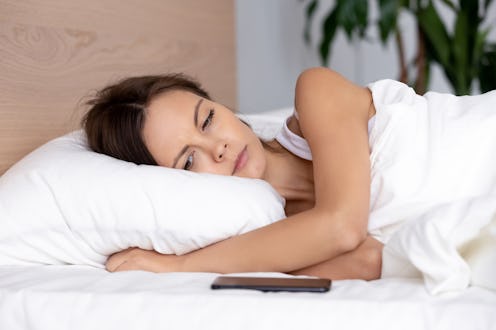Life
Here's What To Do If You Think High-Functioning Anxiety Is Messing With Your Sleep

Anxiety can manifest itself in all kinds of different ways, but one form of the condition that isn't widely discussed is high-functioning anxiety. Although it isn't recognised as an official mental health condition, its effects can still be serious for those experiencing it. In a nutshell, it refers to a person who seems to be living normally despite being plagued by anxious thoughts.Like any other form of anxiety, high-functioning anxiety can have a major impact on your sleep for some key reasons.
"Sometimes people with anxiety inadvertently shrink their own world by avoiding activities that trigger their anxiety," psychologist Suzanne Leckie explained to Women's Health. "Other times anxiety can motivate people to try harder across all aspects of their lives. Their own reality is likely to be one of racing thoughts, restless bodies, and a sense that they are never doing enough.”
Although those with high-functioning anxiety may seem like they're managing to avoid some of the more detrimental impacts of anxiety, it still has many negative impacts. As Women's Health reports, while individuals with the condition may appear punctual, proactive, and organised, these characteristics can actually be a symptom of their anxiety. They may also be joined by more recognisable signs of anxiety like an inability to say no to things, controlling behaviours, repetitive habits, fear, a tendency to catastrophise, and fatigue.
That last one links directly to sleep. The need to overthink every little thing and mentally replay pivotal moments from the day can result in sleepless nights, a sufferer told Healthline. Someone with high-functioning anxiety may also continue to work late into the night, experience insomnia, and talk in their sleep.
They may also find that they wake up excessively early to prepare for the day ahead or do so in fear of being late for work or an appointment. Another sleep-related sign of the condition is that people find it hard to be alone with their thoughts, so do anything to cause a distraction, as Bustle reports. For example, they may fall asleep with the TV on, listen to music or a podcast in bed, or spend precious shut-eye time on their phone.
It's obvious that all of the above can lead to feelings of immense tiredness. And anxiety that has been forced to hide itself throughout the day is bound to unleash itself at night, causing further exhaustion and stress.
One of the ways to overcome high-functioning anxiety is to challenge your default way of thinking by visiting a therapist, psychologist Dr. Crystal I Lee previously told Bustle. A doctor may also be able to advise you of coping mechanisms, but is unlikely to give you a diagnosis.
To receive such a thing, you would have to meet certain criteria included in the Diagnostic and Statistical Manual of Mental Disorders, reports Health. A person with high-functioning anxiety is likely to be holding down a job and seemingly coping with their personal life, so will probably not meet the criteria. And, as previously explained, the condition is not currently recognised as a mental health condition. However, this should not stop you seeking or receiving help for anxious thought patterns, particularly if worry and stress are beginning to have a detrimental impact on your ability to sleep. Sufferers can visit the website of mental health charity Mind for more information.
While waiting for professional help, you could try mindfulness. As Leckie stated to Women's Health: "The strategies can help to anchor us in the present rather than entertaining future-based worst case scenarios."
This article was originally published on